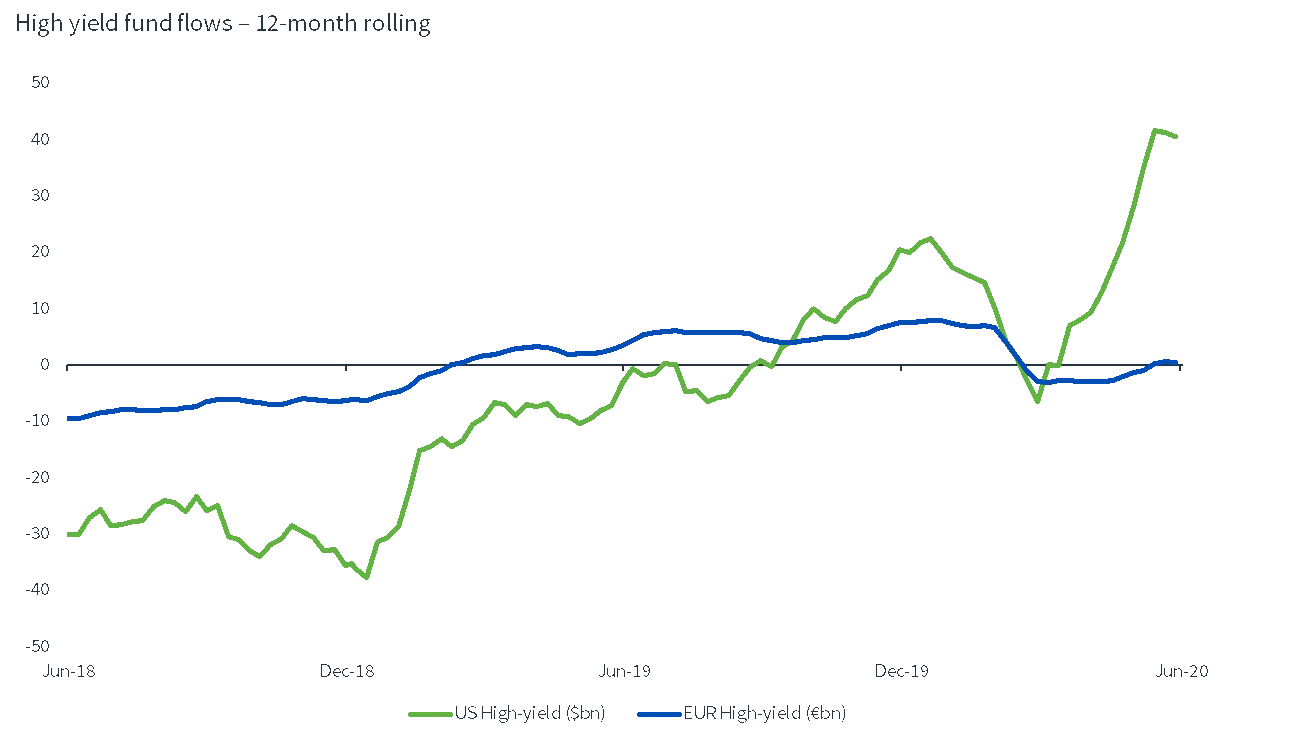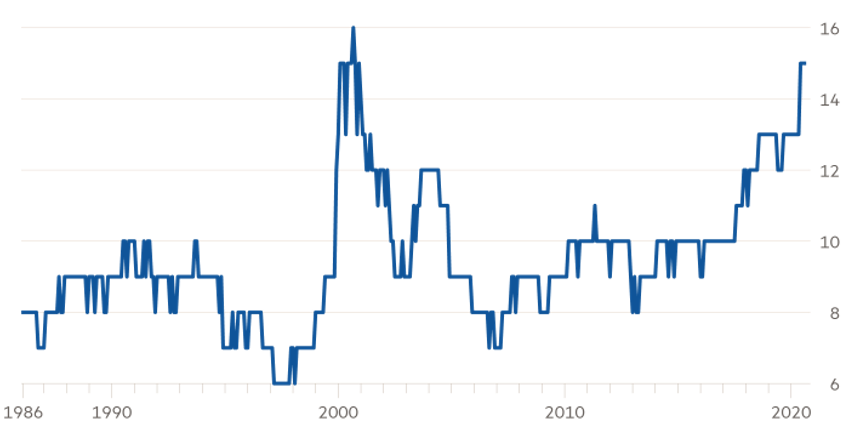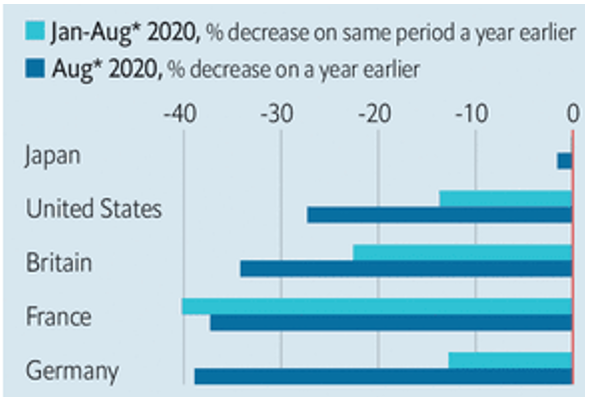|
Global high yield: Stimulus fuels the march of the zombies by Aviva Investors
2 Dec 2020 
Zombie companies are the talk of the town. Will they limp on forever, storing up trouble for investors, or can they revive and thrive after COVID?
Halloween is synonymous with zombie movies. In almost every film, the plot is the same: a clutch of survivors resists as the living dead contaminate everyone around them.
Never has this appeared so apt as in 2020. Dramatic falls in revenues are pushing companies to the brink but, propped up by central bank support, they have managed to survive. These are the zombie firms which, by the definition used by bond investors, are issuers generating profits lower than the interest payable on their debt for at least three years. To stay in business, these firms must borrow more just to pay the interest they owe.
The big focus for investors is how to avoid falling victim to the continuing march of the zombies. In the article, we discuss the impact of the extraordinary monetary policies implemented by central banks in response to COVID-19. While this support remains critical, investors should remember the importance of analyzing individual business models and companies’ prospects for improved profitability over the medium term.
Elixir of life Almost every sector has been disrupted by COVID-19, particularly consumer-driven services. The latter has seen significant issuance as companies scrambled to horde cash. This has been possible thanks to the generosity of central banks pumping liquidity into markets and, in the case of the US Federal Reserve, explicitly supporting high-yield issuers through its bond purchases.1
The European Central Bank is not buying high-yield directly, but there is a trickle-down effect from its support to investment-grade issuers, and from investment-grade investors searching for higher yields. That said, the pickup in fund flows has remained more muted in Europe than the US (Figure 1).
Figure 1: Strong demand for high yield 
Source: Aviva Investors, Lipper, as of June 26, 2020
Rise of the zombies Coupled with massive debt issuance, a steep decline in revenues has created a cohort of zombie companies. Unsurprisingly given the economic backdrop, the number of zombies is rising, as Figure 2 shows.
Figure 2: US zombie companies are on the rise 
Source: Joe Rennison, 'Pandemic debt binge creates new generation of 'zombie' companies', The Financial Times, September 14, 2020
The first worry for investors is if these companies begin to default en masse once their resources are exhausted and they can no longer find new lenders. On this front, the news is reassuring for now.
“Expectations of defaults are decreasing and should stay low as long as monetary policy remains supportive,” says Brent Finck, senior high-yield portfolio manager at Aviva Investors. “In addition to central banks’ bond buying, the liquidity they are injecting into markets needs to be invested somewhere, allowing companies to find takers for their issuance. There is no expectation for this to stop in the near future."2
During the sell-off in March, J.P. Morgan projected default rates for 2020 at above 10 per cent. This was when concerns over the economic impact of COVID-19 were heightened and prior to the announcement of fiscal and monetary support. By October, forecast default rates for US high-yield bonds were down to 6.5 per cent for 2020, and only 3.5 per cent for 2021.3 Although dismal growth suggests bankruptcies should rise, they are so far lower than in 2019 (Figure 3).
Figure 3: Insolvency trends year on year 
Source: The Economist, LCD, S&P Global Market Intelligence, American Bankruptcy Institute, Banque de France, Destatis, The Insolvency Service, Tokyo Shoko Research, as of September 26, 2020
Zombification or new lease of life? It could go wrong. Much of the recent news flow underlines the risks of zombie companies surviving indefinitely, keeping capital invested in less productive parts of the economy with a dampening effect on inflation, interest rates, innovation and growth.4
However, in free-market economies, it should always be possible for entrepreneurial companies to win business.
Where COVID-19 makes it more difficult for investors is that low revenues and high leverage can be found both in companies that were already on their way to zombification before the pandemic, but also in previously healthy firms that now need cash to survive long enough to resume activity.
Cruise lines are a good example. Until the pandemic is under control, they are almost entirely unable to sail and have no revenue potential, while burning cash ($650 million a month for CCL, for example).7
“The sector has seen significant issuance as firms raise liquidity on the presumption that, if they can survive until the end of 2021, a vaccine will have resolved the issue, allowing them to resume operations and profit-making,” explains Paul Janowitz, senior credit analyst at Aviva Investors.
The devil is in the detail
Figure 4: Moody's Covenant Quality Indicator above 4.40 for a 16th consecutive month in August 
Source: Moody's Investors Service, as of September 15, 2020. Note: CQI reflects all high-yield bonds, including high-yield lite. High-yield-lite bonds lack a debt incurrence and/or a restricted payments covenant and automatically receive the weakest possible CQ score of 5.0
Covenants typically impose restrictions on the amount of leverage permitted on a company’s balance sheet, complemented by an obligation to seek existing bondholders’ approval before issuing additional debt and potential penalties to pay when leverage hits certain ratios.
Across high-yield markets, strong demand has given issuers more bargaining power to loosen those restrictions. Some have also found loopholes whereby the amounts used to report their leverage levels do not reflect actual cashflows. This allows them to add debt without triggering ratios, consent fees or seek approval from existing investors.10
At the higher quality end, this year has also seen an increase in fallen angels.11 “As investment-grade companies, they typically did not require covenants, and many have continued to issue bonds as high-yield firms without changing their practices,” says Sunita Kara, senior global high yield portfolio manager at Aviva Investors.
Sources 1 Joe Rennison, Robin Wigglesworth, Colby Smith, 'Federal Reserve enters new territory with support for risky debt,' Financial Times, April 9, 2020. https://www.ft.com/content/c0b78bc9-0ea8-461c-a5a2-89067ca94ea4 2 Webcast, ‘The year of living dangerously: Don't fight the central bankers,’ Aviva Investors, May 2020. https://event.on24.com/eventRegistration/EventLobbyServlet?target=reg20.jsp&partnerref=internalinvitation&eventid=2328323&sessionid=1&key=33FA64219F290844D251B7C27052E7AC®Tag=&sourcepage=register 3 ‘Default Monitor - High Yield and Leveraged Loan Research,’ J.P. Morgan North America Credit Research, October 1, 2020. 4 ‘Why COVID-19 will make killing zombie firms off harder,’ The Economist, September 26, 2020. https://www.economist.com/finance-and-economics/2020/09/26/why-covid-19-will-make-killing-zombie-firms-off-harder; Wolf Richter, ‘The zombie companies are coming,’ Wolf Street, August 26, 2020. https://wolfstreet.com/2020/08/26/the-zombie-companies-are-coming/ 5 ‘Why COVID-19 will make killing zombie firms off harder,’ The Economist, September 26, 2020. 6 Chris Sloley, ‘Why this IG chief is worried about a ‘false sense of security’ in bonds,’ Citywire, July 29, 2020. https://citywireselector.com/news/why-this-ig-chief-is-worried-about-a-false-sense-of-security-in-bonds/a1384853 7 'Carnival Corp & plc (CCL) Q2 2020 Earnings Call Transcript,' The Motley Fool, July 10, 2020. https://www.fool.com/earnings/call-transcripts/2020/07/10/carnival-corp-plc-ccl-q2-2020-earnings-call-transc.aspx 8 Erin Arvedlund, ‘Fed’s Jay Powell creating ’zombie’ firms, says noted Fed watcher,’ The Philadelphia Inquirer, September 7, 2020. https://www.inquirer.com/business/federal-reserve-inflation-danielle-dimartino-booth-jerome-powell-trump-20200907.html 9 ‘Home and leisure in a pandemic: Girls (and boys) still want to have fun,’ Aviva Investors, October 13, 2020. https://www.avivainvestors.com/en-gb/views/aiq-investment-thinking/2020/10/covid-19-impact-on-home-and-leisure/ 10 'North American Bond Covenant Quality Indicator' and 'Covenants — Europe' reports, Moody's Investors Service, respectively September 15 and August 26, 2020. 11 Sunita Kara, ‘The impact of COVID-19 on global high yield,’ Aviva Investors, April 20, 2020. https://www.avivainvestors.com/en-gb/views/aiq-investment-thinking/2020/04/the-impact-of-covid-19-on-global-high-yield/
YOU MAY ALSO LIKE THIS
Aviva Investors' Disclaimer
Important Information The name “Aviva Investors” as used here refers to the global organisation of affiliated asset management businesses operating under the Aviva Investors name. Each Aviva Investors affiliate is a subsidiary of Aviva plc, a publicly‐traded financial services company headquartered in the United Kingdom.
Except where stated as otherwise, the source of all information is Aviva Investors as at 17 November 2020.
The information in this document is general in nature and has not been designed to take into account the particular circumstances of any investor or class of investors, their investment objectives or needs. Before making any investment based on any information in this document, recipients should consider the appropriateness of the information having regard to their financial situation, objectives, and needs. Investing in the financial products and or services described in this document is not without significant risk, including the risk of delays in the ability to redeem any investment, the risk of loss of capital invested or income expected to be derived, and share, unit or market price fluctuations. Prospective investors are strongly advised to seek their own financial advice about the merits of any investment.
Any opinions expressed are based on the internal forecasts of Aviva Investors and should not be relied upon as indicating any guarantee or assurance of return from an investment or strategy managed by Aviva Investors. No part of this document is intended to constitute advice or a recommendation of any nature. The value of an investment can go down as well as up and can fluctuate in response to changes in the foreign exchange rates of the currencies in which underlying investments are denominated.
Past performance is not a guide to future performance. Performance figures shown are sourced from Aviva Investors unless indicated otherwise, on the pricing and income reinvestment basis stated.
The distribution and offering of shares may be restricted by law in certain jurisdictions. This document is not and should not be taken or construed as a recommendation, solicitation or offer either (i) by anyone in any jurisdiction in which such an offer, recommendation or solicitation is not authorised or (ii) to any person in any jurisdiction to whom it is unlawful to make such an offer, recommendation or solicitation.
You are not authorised to redistribute this document nor qualified to make any offer, representation or contract on behalf of Aviva Investors on the basis of this document.
Telephone calls to Aviva Investors may be recorded for training or monitoring purposes.
Aviva Investors Asia Pte. Limited, a company incorporated under the laws of Singapore with registration number 200813519W, holds a valid Capital Markets Services Licence to carry out fund management activities issued under the Securities and Futures Act (Singapore Statute Cap.289) and is an Exempt Financial Adviser for the purposes of the Financial Advisers Act (Singapore Statute Cap. 110).Registered Office: 1 Raffles Quay, #27-13 South Tower, Singapore 048583.
IMPORTANT INFORMATION SINGAPORE: This document is not a prospectus registered with the Monetary Authority of Singapore. Accordingly, this document and any other document or material in connection with the offer or sale, or invitation for subscription or purchase, of shares, units or interests may not be circulated or distributed, nor may the shares, units or interests be offered or sold, or be made the subject of an invitation for subscription or purchase, whether directly or indirectly, to persons in Singapore other than (i) to an institutional investor pursuant to Section 304 of the Securities and Futures Act, Chapter 289 of Singapore (the “SFA”) or (ii) otherwise pursuant to, and in accordance with the conditions of, any other applicable provision of the SFA.
dollarDEX's Disclaimer
All information here is for GENERAL INFORMATION only and does not take into account the specific investment objectives, financial situation or needs of any specific person or groups of persons. Prospective investors are advised to read a fund prospectus carefully before applying for any shares/units in unit trusts. The value of the units and the income from them may fall as well as rise. Unit trusts are subject to investment risks, including the possible loss of the principal amount invested. Investors investing in funds denominated in non-local currencies should be aware of the risk of exchange rate fluctuations that may cause a loss of principal. Past performance is not indicative of future performance. dollarDEX is affiliated with Aviva but dollarDEX does not receive any preferential rates for Aviva products as a result of this relationship. Unit trusts are not bank deposits nor are they guaranteed or insured by dollarDEX. Some unit trusts may not be offered to citizens of certain countries such as United States. Information obtained from third party sources have not been verified and we do not represent or warrant its accuracy, correctness or completeness. We bear no responsibility or liability for any error, omission or inaccuracy or for any loss or damage suffered by you or a third party (including indirect, consequential or incidental damages) arising in any way from relying on this information.
This information does not constitute an offer or solicitation of an offer to buy or sell any shares/units.
Information is correct as of 02/12/2020. |




